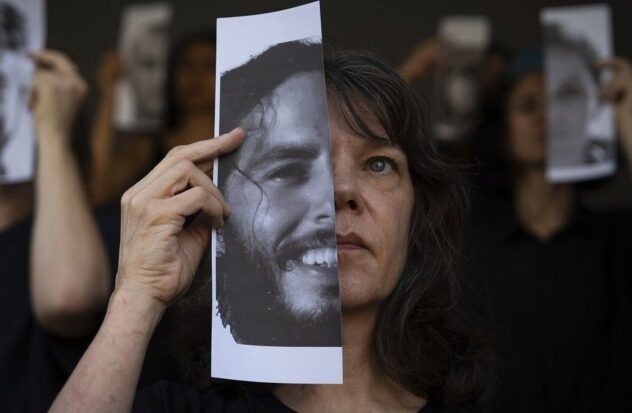TEL AVIV.- The bodies of three other hostages killed on October 7 were recovered overnight in the Gaza Strip, Israel’s military said on Friday, as the United Nations’ top court prepared to decide Israel must suspend its military operations and withdraw from the Gaza Strip. besieged enclave.
The bodies of Hanan Yablonka, Michel Nisenbaum and Orion Hernández Radoux were found, whose families were informed. The army explained that the three died on the day of the Palestinian insurgent assault at the Mefalsim crossing and their bodies were taken to Gaza.
The announcement comes less than a week after the army revealed the discovery of three more dead Israeli hostages on October 7.
The insurgent incursion led by Hamas left around 1,200 dead, mostly civilians, while another 250 people were captured as hostages. Nearly half have since been freed, most of them in exchanges for Palestinians imprisoned in Israel during a week-long ceasefire in November.
According to Israel, around 100 hostages remain captive in Gaza, along with the bodies of around 30 other people.
Israel’s Prime Minister Benjamin Netanyahu has promised to eliminate Hamas and bring all hostages back, but has made little progress. He faces pressure to resign from office and the United States has threatened to reduce its support due to the humanitarian situation in the Palestinian territory.
Netanyahu said Friday that the country had a duty to do everything possible to return those kidnapped, both those who have died and those still alive.
The country also expects the International Court of Justice to rule on South Africa’s urgent request to order Israel to cease operations on Friday afternoon. Israel is unlikely to comply with such an order, but the ICJ judges’ ceasefire order would raise pressure on a country increasingly isolated on the international stage.
Regarding the hostages, Israelis are divided into two camps: those who want the government to stop the war and free them, and those who believe they are an unfortunate price to pay for eradicating Hamas. Intermittent negotiations, mediated by Qatar, the United States and Egypt, have achieved few results.
Outrage over the way the government is handling the hostage crisis is growing.
Earlier in the week, a group representing the hostages’ families released a new video showing Hamas’s capture of five Israeli female soldiers near the Gaza border on October 7.
The video shows several of the soldiers bloodied and injured. In one of the scenes, an insurgent tells one of the terrified women that she is beautiful.
The recording sparked more protests across the country demanding the release of the hostages.
The Israeli army explained on Friday that the hostages were found during an operation in Jabaliya. Military spokesman Rear Admiral Daniel Hagari said at a news conference that the military was able to recover the bodies thanks to “critical intelligence” discovered last week by Israeli forces operating in Gaza.
The group representing the families of the captives indicated that the mortal remains were returned to the families for burial.
Nisenbaum, 59, was a Brazilian-Israeli living in the southern Israeli city of Sderot who was captured while trying to rescue his 4-year-old granddaughter.
Oryon Hernández Radoux, 30, was a French-Mexican citizen arrested at the Nova music festival, which he attended with his partner, Shani Louk. Louk’s body was one of those located almost a week ago.
Yablonka, a 42-year-old father of two, was also at the festival. In December, his family told The Associated Press that he loved music. The family did not hear from him for almost two months after his capture and did not know if he was alive or dead.
Since the start of the war, the Israeli offensive has claimed the lives of more than 35,000 Palestinians, according to the Gaza Health Ministry, and caused a humanitarian crisis and famine.
Although the military campaign has weakened Hamas’ capabilities, after almost eight months of war, the insurgents are regrouping in some of the hardest hit areas in the north of the enclave and have resumed their rocket attacks on nearby Israeli communities. Israel says its troops are operating in Rafah, on the southern edge of Gaza, and in Jabaliya, in the north.
Source: With information from AP

